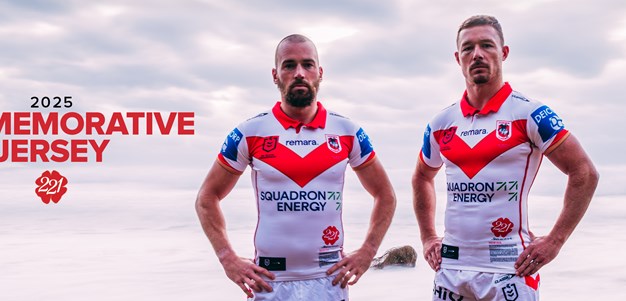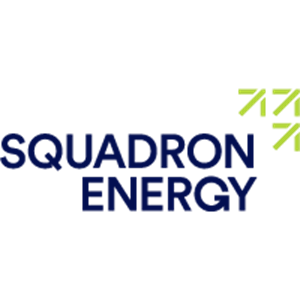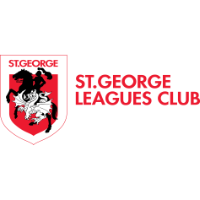The Dragons started 2021 like a team bound for a shock finals appearance before the cracks started to appear and a major mid-season COVID breach precipitated an ignominious slide towards an 11th place finish.
In coach Anthony Griffin's first year at the club, constant ructions around which players were and were not in favour also generated plenty of inconsistency in team selections, with major roster changes set to revamp the team ahead of 2022.
It's frustrating for fans that a season that initially held low expectations could promise so much early and ultimately deliver so little but that doesn't mean there weren't some silver linings
2021 season by the numbers
Regular season win/loss record
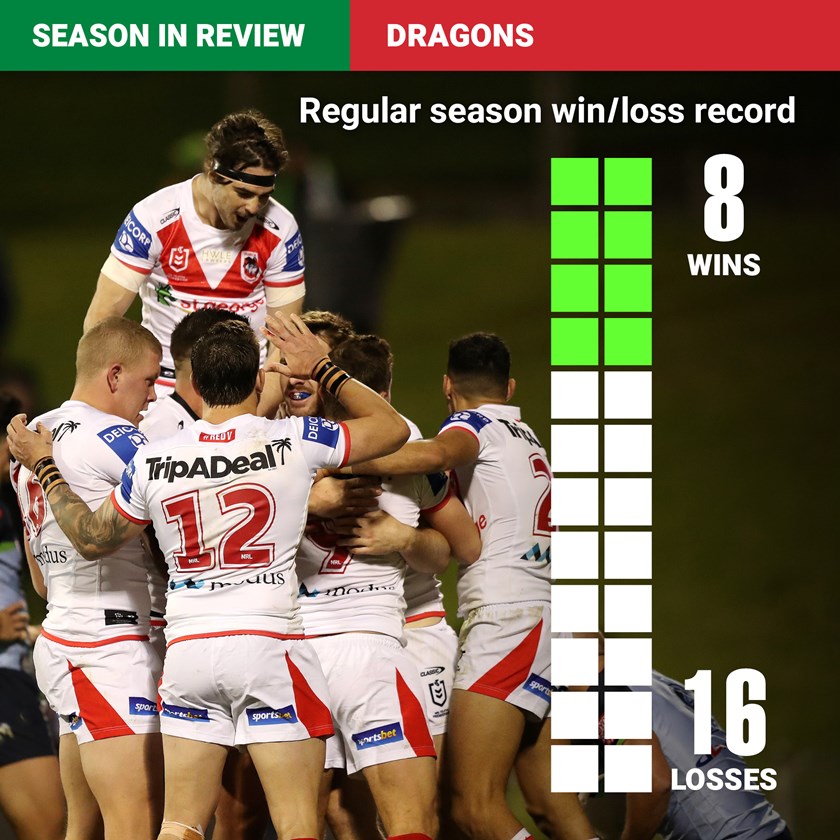
Four of the Dragons' eight wins for the year came in the first five rounds, with the highlight a powerful win over the then-unbeaten Eels at their Bankwest (now CommBank) Stadium fortress that made the competition sit up and take notice.
That was as good as it got though; they won just one of their next seven and four of their last 19, including eight straight losses to finish the season with not a single victory once the NRL was forced to relocate to Queensland.
They won two of five at Kogarah and two of three at Wollongong.
Run metres differential
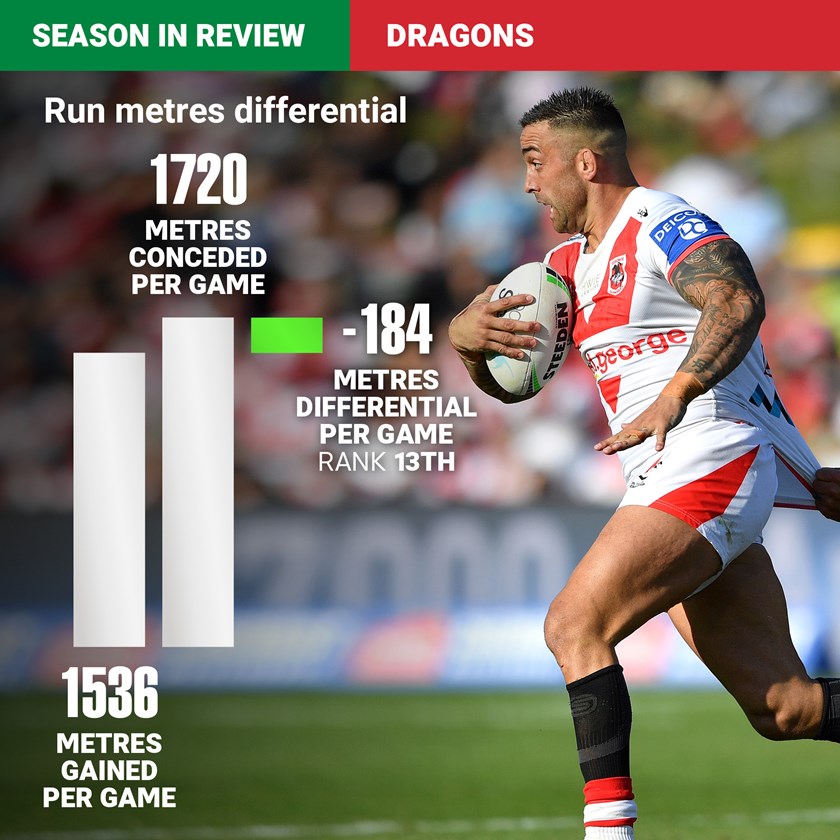
The Dragons consistently lost the yardage game in 2021, making fewer metres than any other club bar the last-finishing Bulldogs.
Mikaela Ravalawa (154m per game) and Dufty (153) were the only men to average over 150 metres per match and even Dufty's record was just the 10th best of regular fullbacks.
Paul Vaughan (144m per game) was the main yardage man in the pack and the only forward to average better than 120 metres per game; his impact in the middle was badly missed after his now-infamous COVID breach cost him his contract.
Try scoring - game time
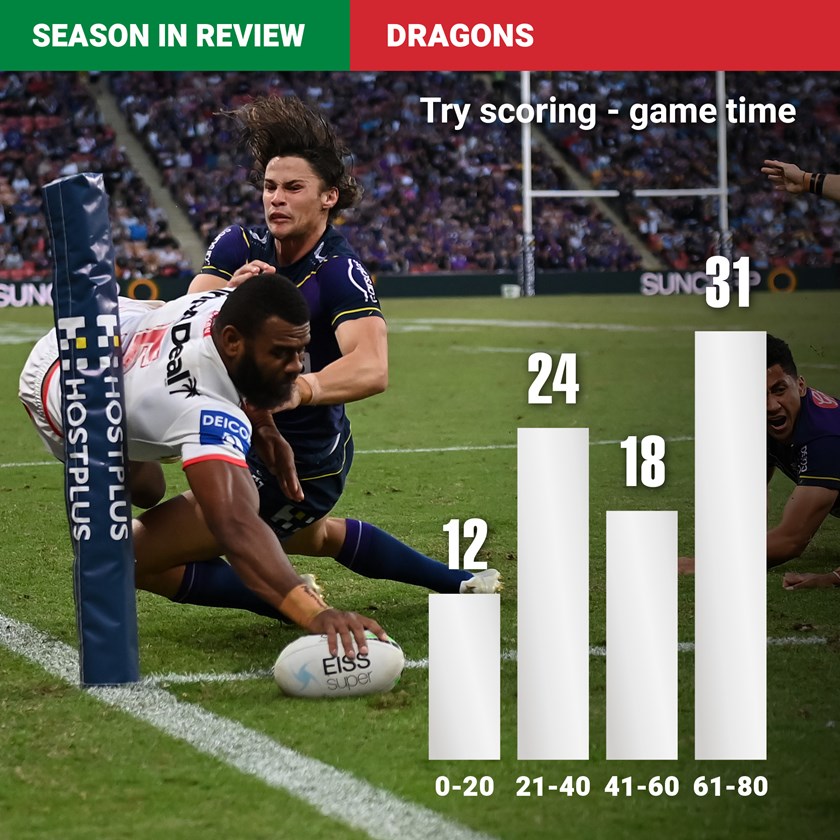
The Dragons found tries comparatively hard to come by in the first 20 minutes of each half throughout 2021, but ranked inside the top eight for tries scored in the second half of each half.
Most teams averaged more tries scored later in halves as defences tired and games opened up but the difference for the Red V was more stark than for most.
Tries conceded - game time
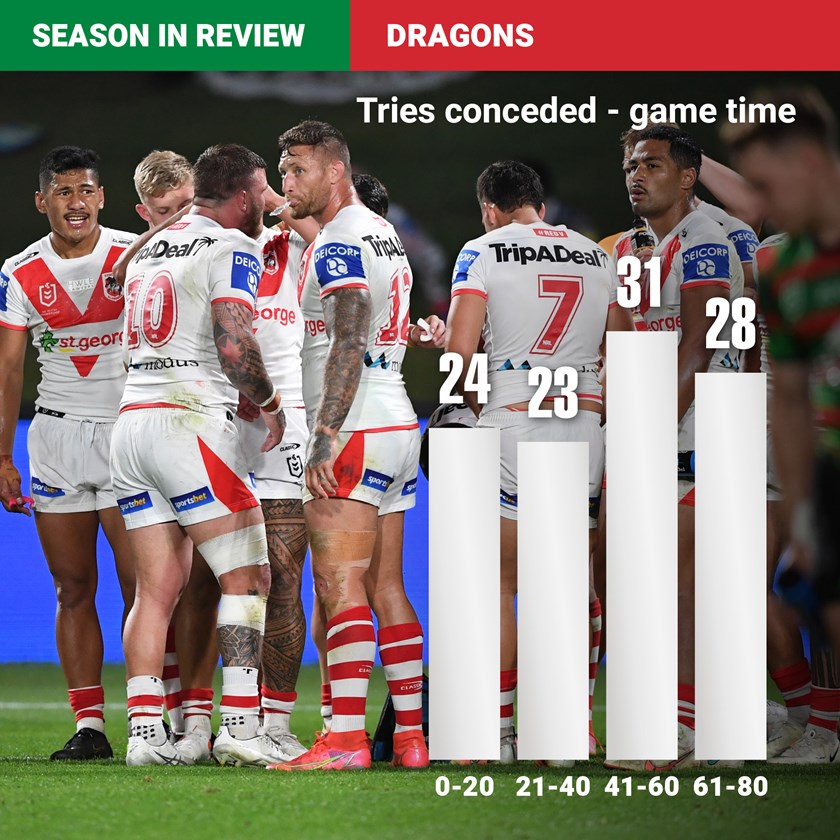
Defensively the Dragons also improved in the second 20 minutes of each half, letting in far too many tries in the 20 minutes from each stanza kicking off.
Their quarter by quarter try differential was -12, +1, -13 and +3, showing just how much they favoured the back ends of halves. Missing the jump proved costly throughout the year.
Tries scored/conceded from six-agains
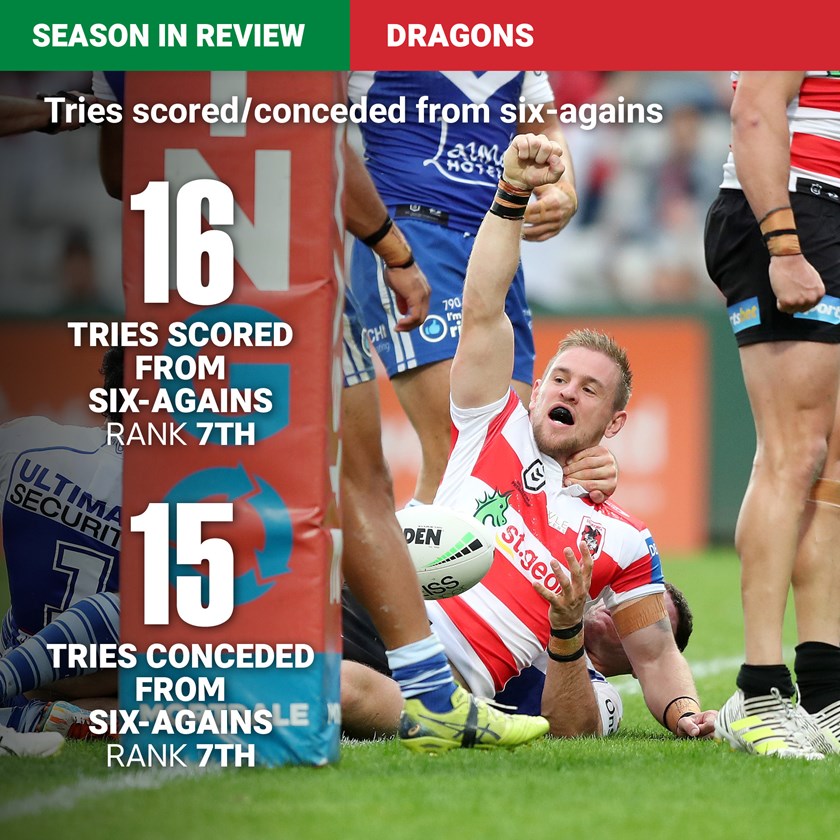
The Dragons tended not to foul of the new rules in 2021, figuring in the top half of the competition at both scoring tries off the back of a set restart and in defending the sets after giving one away.
Their 16 scored off the back of a six-again was seventh best and featured just two from offside restarts with 14 from ruck infringements.
Defensively they were scored on just once all year in the set after a 10m restart with 14 more conceded in the set after a ruck infringement, but the total of 15 was still seventh best in the NRL.
Metres gained from offloads
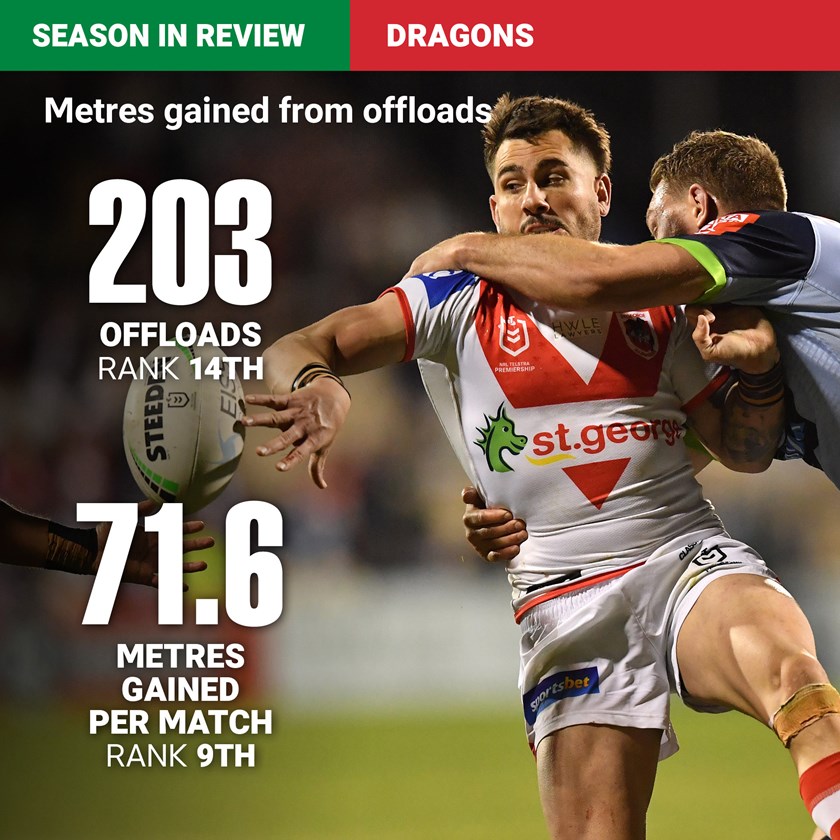
The Dragons weren't a prominent offloading side in 2021, throwing the 14th most of any side. Offloads show little correlation to success – that is, the top few offloading sides could just as easily come from the top or bottom of the ladder but it can still be a point of difference in attack.
What offloads the Dragons did come up with tended to come from the backs with Jack Bird (29 for 237 metres added) leading the way.
Josh Kerr (27 for 304 metres added) was easily the most prolific in the pack with Ben Hunt (27 for 220 metres) and Corey Norman (16 for 130) the other notable offloaders in the side.
While they threw the 14th most offloads they added the ninth most metres from offloads, indicating their pass selection was mostly effective when they did decide to slip an offload away.
Goal-kicking accuracy
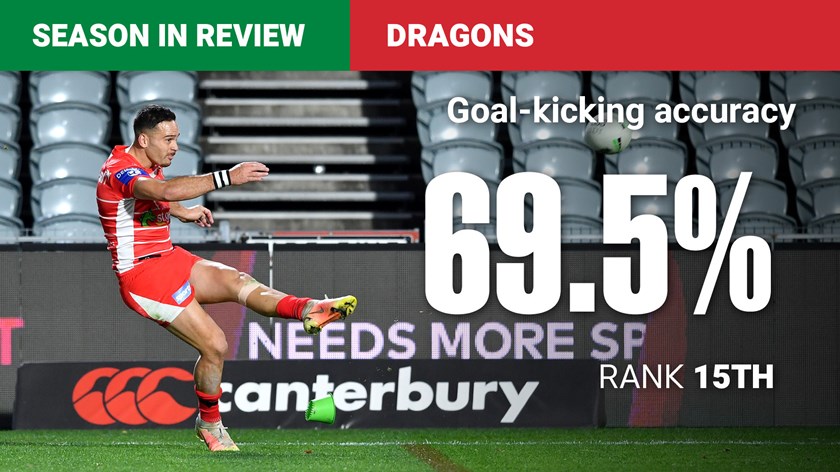
The long-term injury to sharpshooter Zac Lomax really hurt the Dragons' goal-kicking in 2021. Norman is a reluctant kicker at best but had to shoulder primary duties for much of the year, finishing with a 61% success rate.
Lomax went at 77.8% when he was on the field while Jack Bird kicked six from eight when called upon.
It didn't prove too costly though; there was only one game in 2021 the Dragons lost that they could have won with better goal-kicking – a 13-12 loss to the Sharks in round 11 that featured two missed conversions.
Players used
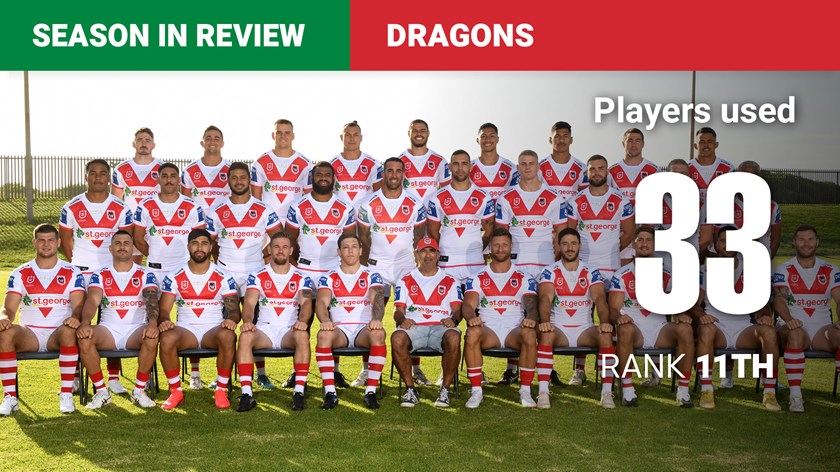
The Dragons used slightly more players than average but in a season where most teams were hit by injury, suspension and mid-year moves it wasn't out of the ordinary.
The post-barbeque suspensions and departure of Vaughan caused some disruption while injuries to Lomax, Ben Hunt and Andrew McCullough didn't help.
The club handed out four NRL debuts through the year including to likely future stars Talatau Amone, Mat Feagai and Tyrell Sloan who all showed plenty of promise.
Tackles made per game
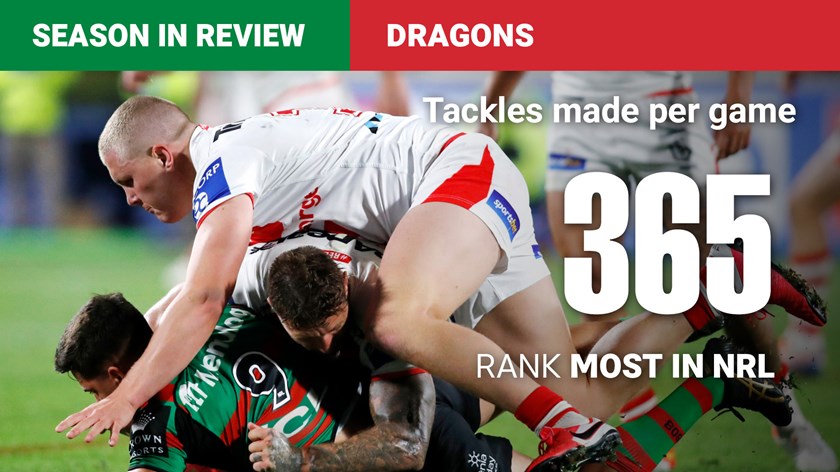
It's tough to get into the grind when you're being forced to make far more tackles than your opposition, and that's the position the Dragons found themselves in more often than not in 2021.
Across the season they averaged 365 tackles completed per match – the most in the NRL.
Their tackle effectiveness was a respectable 87.7% (11th best but less than a percentage point from the next six teams above them) but through sheer volume their missed tackles per match were 34.9 – the third most.
Their 417 attempted tackles per match was easily an NRL high, eight clear of next most North Queensland and 26 more than the most from any top eight side, Newcastle's 393.
Kicks per game
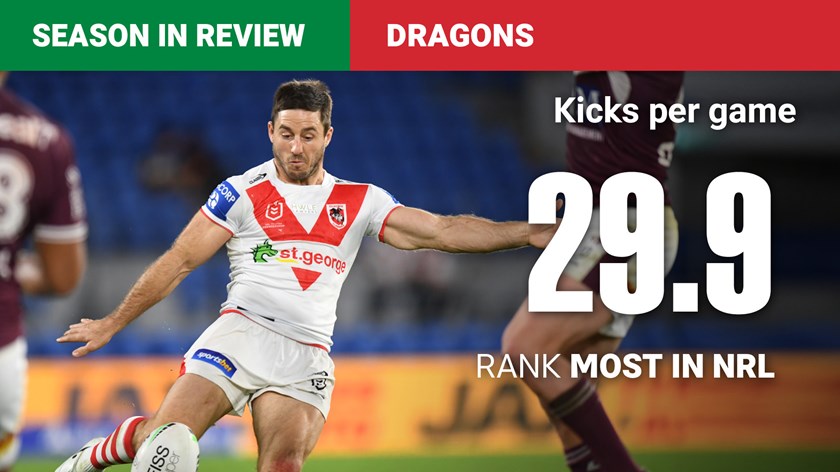
Perhaps a by-product of their possession woes as much as any deliberate strategy, the Dragons booted an NRL-high 29.9 kicks per match in 2021.
That's just over one kick per match more than the next-most from the Bulldogs (28.7) who also needed to kick out of trouble regularly, while the Panthers (28.3) figured third but were more often rolling grubbers into the in-goal or launching attacking bombs than clearing from their own end.
Norman averaged 8.6 kicks per match and 32 metres per kick while Hunt (9.8 per match at 29.0 metres per kick) was the other main contributor while Adam Clune, McCullough and Amone chipped in.




